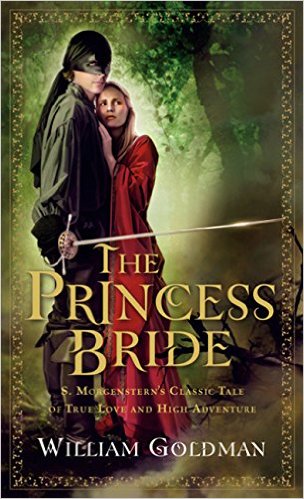 Found another one. In addition to Stardust and The Natural, The Princess Bride by William Goldman is a better film than book.
Found another one. In addition to Stardust and The Natural, The Princess Bride by William Goldman is a better film than book.
I read the latter this month and was in awe of the actual book within a book. Admittedly, Goldman is a remarkably creative, funny, and powerful writer. But the literary mechanism he uses to set up, interject, and conclude the beloved ’80s story — in this case pretending to be a humbled author searching for his next great hit by abridging “the good parts version” of another fictional author’s larger work — detracts from an otherwise five-star effort.
I suspect even Goldman realized this when writing his award-wining screenplay for the actual movie 14 years after publishing the book. Instead of his original, confusing, and over-the-top author trope, Goldman instead opts for the much cleaner “grandpa reading the story to his sick grandson” setting.
Either way, Goldman is a sarcastic genius. And I’m glad he finally got it right. Four stars out of five. Would have awarded it five stars had it not been for the above oversight.
If you do read it, skip the setup, treat Goldman’s interjections as author’s notes, and head straight for the exceptional story of true love, Inigo’s heartwarming backstory that is strong enough to stand on its own, and dozens of beautiful passages like this:
- The woman who emerged was a trifle thinner, a great deal wiser, an ocean sadder. This one understood the nature of pain, and beneath the glory of her features, there was character, and a sure knowledge of suffering.
- The rope seemed almost alive, the greatest of all water serpents heading at last for home.
- His eyes bulged wide, full of horror and pain. It was glorious. If you like that kind of thing.
- I really do think that love is the best thing in the world, except for cough drops. But I also have to say, for the umpty-umpth time, that life isn’t fair. It’s just fairer than death, that’s all.
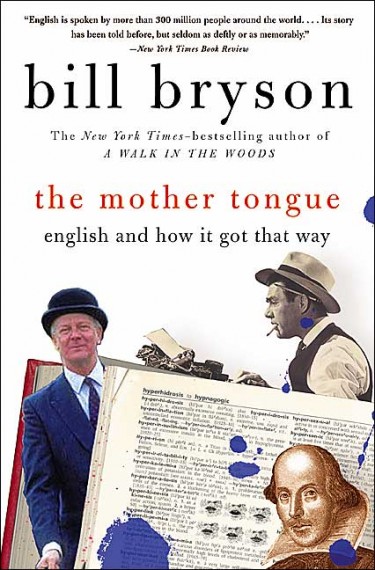 Although English is the third most spoken language after Mandarin and Spanish, it is the most spoken second language in the world. This is due to the power-brokers that speak it, its uniquely expressive vocabulary, and how it came to be, argues Bill Bryson in The Mother Tongue.
Although English is the third most spoken language after Mandarin and Spanish, it is the most spoken second language in the world. This is due to the power-brokers that speak it, its uniquely expressive vocabulary, and how it came to be, argues Bill Bryson in The Mother Tongue.
For being more like Bryson’s interesting read on domestic life and less like his masterpiece on science, I award it three stars out of five. These were my favorite passages:
- What most immediately sets English apart from other languages is the richness of its vocabulary. Altogether, about 200,000 English words are in common use, more than in German (184,000) and far more than in French (a mere 100,000). This richness and wealth of available synonyms means English speakers can often draw shades of distinction unavailable to non-English speakers. Continue reading…
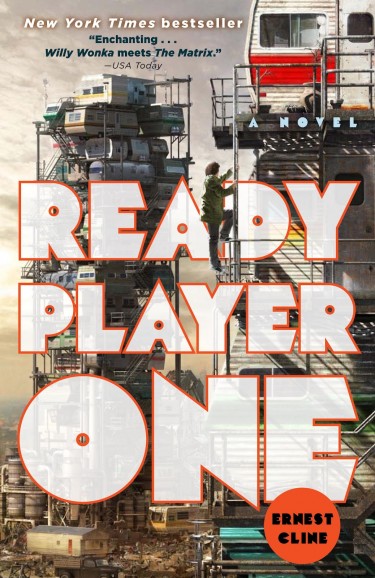
What might happen if humans lived an entirely simulated life, doing everything online except for eating and sleeping?
Earnest Cline has a dystopian, geeky, and fist-pumping answer in Ready Player One, his best-selling novel which I read over the holidays.
The story takes place in 2044 and follows a teenage prodigy named Wade as he seeks hidden fame, power, and fortune bequeathed by the world’s richest man. “But when Wade stumbles upon the first clue,” reads the synopsis, “he is beset by rivals that will kill for the prize, forcing him to confront the real world he’s always been so desperate to escape.”
Clever, huh? USA Today accurately described it as “Willy Wonka meets The Matrix.” I’d add a little Brave New World, ’80s game geek culture, Tron, and “The Wreck-It-Ralph of books” for good measure—all good things.
For fellow nerds who appreciate those things, I award the book a tilted four and a half out of five stars. For everyone else, particularly those who share my desire to curb compulsion disorders, I give it four stars.
These were my favorite passages: Continue reading…
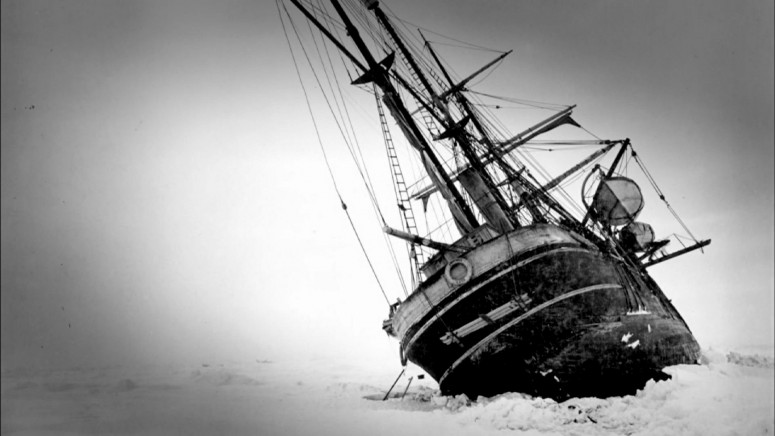
wikimedia commons
I recently finished Shackleton’s Incredible Voyage by Alfred Lansing, which tells the unlikely true story of the titular captain saving all of his crew after his ship was crushed by Antarctic ice floes in 1914.
All told, the 28 men survived 18 months on sea, ice, and one inhospitable island, while enduring unthinkable cold, the worst weather ever, and the first terrestrial crossing of South Georgia. Even more amazingly, they largely did it with jovial spirits, which helped them persevere and ultimately conquer death.
As I said before, Lansing’s writing is so intensely riveting, I was literally gulping and gasping for air at times. If it weren’t for a somewhat halted plot in the second quarter, I would award the book five out of five stars. These are my favorite passages: Continue reading…
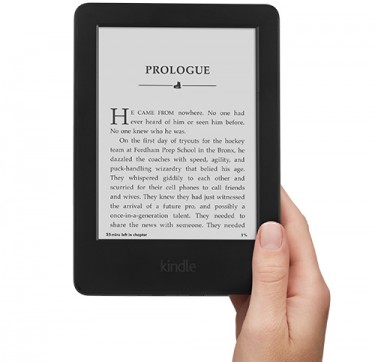 I only read six books this year. Eight if you count the 50 page summaries I read of How To Influence People and Millionaire Next Door, two popular business books.
I only read six books this year. Eight if you count the 50 page summaries I read of How To Influence People and Millionaire Next Door, two popular business books.
Regardless, the total was less than half of what I normally devour in a year — a little over one a month. No matter. I’d like to think I’m doing this instead.
Still, I’d like to read more next year. So before starting The Space Merchants, The Power Broker, and a dozen more samples I have downloaded to my Kindle, these are the books I enjoyed most in 2015: Continue reading…

I recently finished The Last Place on Earth, Roland Huntford’s well-researched, sometimes heavy-handed, but always legendary retelling of the 1911 South Pole race between Roald Amundsen and Robert Scott. In addition to being published the year I was born, the book’s important for the following reasons: Continue reading…
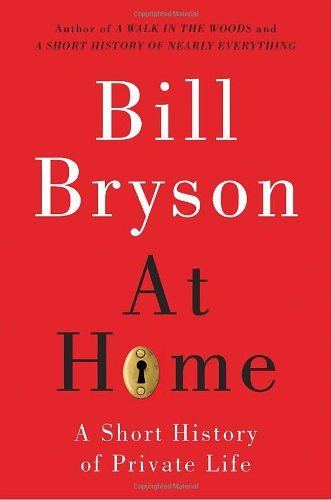 Because he wrote this masterpiece, I consider Bill Bryson one of the greatest non-fiction writers of our time. And while his similar At Home: A Short History of Private Life is brimming with domestic insights, it’s not as powerful or focused as the former. Three stars out of five. I’d only recommend it to die-hard home owners. My favorite passages:
Because he wrote this masterpiece, I consider Bill Bryson one of the greatest non-fiction writers of our time. And while his similar At Home: A Short History of Private Life is brimming with domestic insights, it’s not as powerful or focused as the former. Three stars out of five. I’d only recommend it to die-hard home owners. My favorite passages:
- That’s really what history mostly is: masses of people doing ordinary things… eating, sleeping, having sex, or endeavoring to be amused.
- So sedentism meant poorer diets, more illness, lots of toothache and gum disease, and earlier deaths. What is truly extraordinary is that these are all still factors in our lives today.
- The dining table was a plain board called by that name. It was hung on the wall when not in use, and was perched on the diners’ knees when food was served. Over time, the word board came to signify not just the dining surface but the meal itself, which is where the board comes from in room and board.
- It has been estimated that 60 percent of all the crops grown in the world today originated in the Americas. These foods weren’t just incorporated into foreign cuisines. They effectively became the foreign cuisines. Imagine Italian food without tomatoes, Greek food without eggplant, Thai and Indonesian foods without peanut sauce, curries without chilies, hamburgers without French fries or ketchup, African food without cassava. There was scarcely a dinner table in the world in any land east or west that wasn’t drastically improved by American foods.
- Had Thomas Jefferson and George Washington merely been plantation owners who built interesting houses, that would have been accomplishment enough, but in fact of course between them they also instituted a political revolution, conducted a long war, created and tirelessly served a new nation, and spent years away from home. Despite these distractions, and without proper training or materials, they managed to build two of the most satisfying houses ever built.
Continue reading…
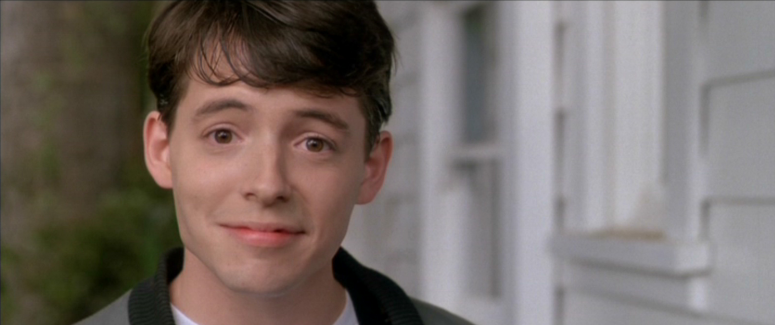
Paramount Pictures
I recently read Dale Carnegie’s popular How to Win Friends and Influence People. Here’s what I learned:
- Trying to understand people is more effective than criticism. Not only does it bring clarity, it breeds tolerance and kindness, which engenders people. So before criticizing someone’s effort or creation, ask them why they did what they did. See things from others’ viewpoints. As a born critic, this is difficult for me to do. But I’ve already seen how effective this is after using it on those closest to me.
- Smile when greeting and talking to people. This is a simple and powerful act. “The expression one wears on one’s face is far more important than the clothes one wears on one’s back,” Carnegie writes, this coming from someone who notes the power of dressing nice. And from someone who says “one” quite a lot. Continue reading…
 I posses five and a half of the seven denominators of American millionaires, according to The Millionaire Next Door. Assuming each of these traits are weighted equally, I have a 79% chance (78.5% to be exact) of becoming one.
I posses five and a half of the seven denominators of American millionaires, according to The Millionaire Next Door. Assuming each of these traits are weighted equally, I have a 79% chance (78.5% to be exact) of becoming one.
While the extra play money would be fun, I’m content with my thousandaire status. I have my health. I’ve got my soulmate. I found my calling.
I have five fabulous children, many uplifting friends, and a loyal dog. When kids ask me if I’m “rich,” I say yes, because I am.
Enough of the feel-good crap. A millionaire I am not. Let’s get down to numbers: Continue reading…
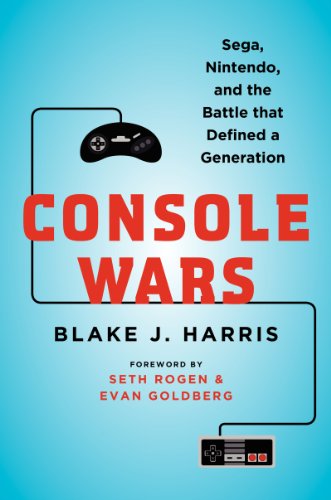 For any male readers born from the mid ’70s to early ’80s, listen up—Console Wars by Blake Harris has it all: your childhood, the answer to your next marketing challenge, cultural divides, innocence, under bellies, triumph, and loss.
For any male readers born from the mid ’70s to early ’80s, listen up—Console Wars by Blake Harris has it all: your childhood, the answer to your next marketing challenge, cultural divides, innocence, under bellies, triumph, and loss.
It’s also the only book I’ve ever read that made me feel as young as I am old. Take these gems, for example:
- “There was no such thing as a magic touch, and it wouldn’t have mattered if there were, because the only thing it takes to sell toys, vitamins, magazines (or anything) is the power of story. That was the secret. That was the whole trick: to recognize that the world is nothing but chaos, and the only thing holding it (and us) together are stories… When you tell memorable, universal, intricate, and heartbreaking stories, anything is possible.”
- “Tony Harman was prepared to leave with his tail between his legs (smiling, though, as his thesis that western cultures can make great games too had made it all the way to the top), but he decided to try one more approach. “Let me just ask one more question,” he said, taking a step toward [Nintendo President] Yamauchi. “How many bad television commercials do we make each year?” Continue reading…

courtesy: snow family
I don’t remember everything I read this year. But excluding short-form literature, these are the books and essays that impacted me most: Continue reading…

credit: blake snow
I haven’t written one of these in half a decade. In the spirit of Thanksgiving, here goes again. Continue reading…
 I’ve been working my way through some of history’s best-rated science fiction novels. And “no,” I don’t distinguish sci-fi from fantasy.
I’ve been working my way through some of history’s best-rated science fiction novels. And “no,” I don’t distinguish sci-fi from fantasy.
Overall, I find the technical language of books such as Hyperion, Shockwave Rider, and others with ridiculous covers—the kind Gentlemen Broncos makes fun of—too distracting to enjoy. Reading them feels like work. It’s almost as if the author wants me to decipher or decode the language before understanding it. It’s why I abandon many of these books, including The Hobbit. After all, I read to enjoy or educate myself—not learn a fictional language.
When they’re not using overly technical and distracting language, sci-fi novels often finish in confusing or unpoetic form, as is the case with Ender’s Game, an otherwise clever book. Now, I haven’t completely given up on the genre. I still have Dune, Starship Troopers, 10,000 Leagues Under the Sea, A Hitchhiker’s Guide to The Galaxy, and others on my list.
My faith in the genre skyrocketed today, however, after reading the first chapter of Planet of the Apes. It’s one of the best opening chapters I’ve read of any genre. It’s so captivating, I dare any imaginative mind over the age of 10 to read the first chapter and desist. It’s humanly impossible. Try it yourself if you don’t believe me, for free even.
That’s how you pull someone into a novel. Bravo, Pierre Boulle.
UPDATE: After finishing the book, I now regard Planet of the Apes as masterpiece literature—from beginning, middle, to the very ironic ending. Five stars out of five.
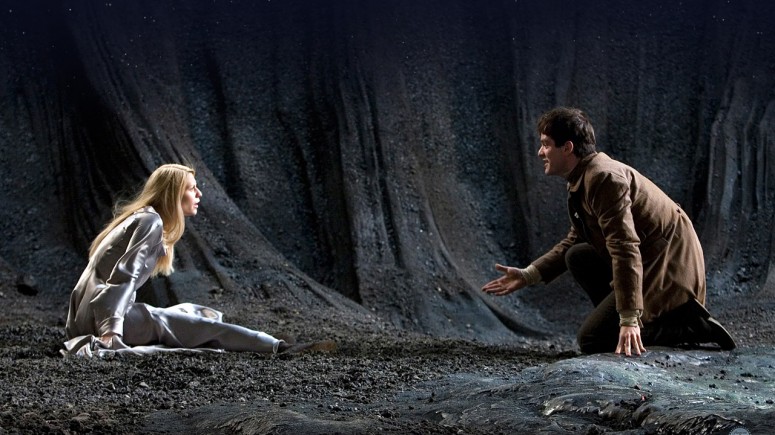
Paramount Pictures
My wife and I watched Stardust recently. It’s been on my watch list for years, given its high viewer rating. But the crap poster always kept me from hitting “play.”
I’m glad I finally did. Stardust is a five-star film. The best fantasy movie I’ve seen since The Princess and the Bride—maybe even better. It’s certainly better than the under-edited Lord of The Rings, the most popular fantasy film of late. (Don’t worry nerds, I kept my sub-genres separated.)
In any case, I liked Stardust so much, I immediately read the book. It’s good but ends with a limp. The movie, on the other hand, ends with an enormous and climatic bang. The similarly-ended The Natural is the only other movie I can think of that is better than the book.
Can you name any others?
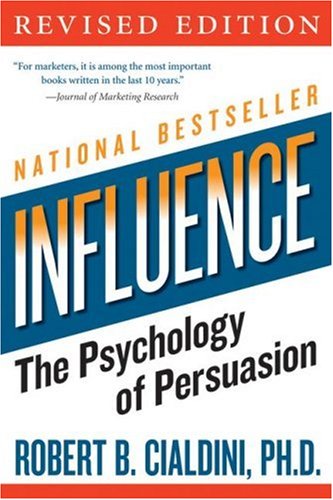 Humans are usually influenced in one of six ways, argues Robert Cialdini in Influence: The Psychology of Persuasion. I suspect there are a lot more subtle and intricate ways to influence, but I think Cialdini certainly covered the highlights in his popular book published in 1984. They are as follows:
Humans are usually influenced in one of six ways, argues Robert Cialdini in Influence: The Psychology of Persuasion. I suspect there are a lot more subtle and intricate ways to influence, but I think Cialdini certainly covered the highlights in his popular book published in 1984. They are as follows:
- Reciprocity. Humans feel obligated to return favors and gifts, even unwelcome ones—which partially explains why their are so many free samples in life. Hence, giving away something for free is an effective way to influence. You can avoid this influence by distinguishing uninvited gifts from welcome ones. For example, “I didn’t want this free food sample to being with, so I won’t feel obligated in giving you anything in return if I take it. Another thing to beware of are unwelcome concessions; say a door-to-door salesman that asks you to donate a large sum to a cause you aren’t interested in, only to lower the donation amount in the hopes you’ll donate something. The takeaway: Don’t donate unless you want to, not because someone is seemingly compromising. Continue reading…
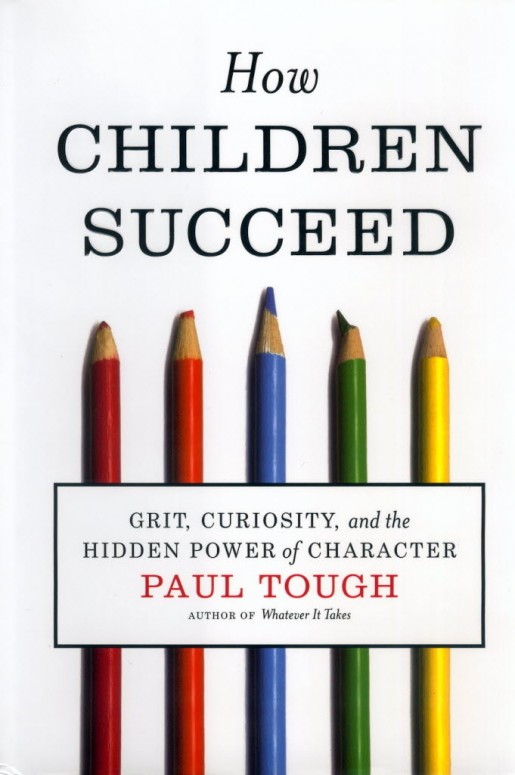 Build character, not intelligence. That’s the gist of what parents, educators, and society should do to help children succeed, argues Paul Tough in his new book.
Build character, not intelligence. That’s the gist of what parents, educators, and society should do to help children succeed, argues Paul Tough in his new book.
Many of Tough’s “findings” are obvious, mind you. More scientific validation of common sense than childrearing enlightenment, at least for balanced parents.
Nevertheless, Tough succeeds in synthesizing some important focal points for raising upstanding kids. Here they are, with my added commentary:
- Let children fail. It’s tempting to want to force a child to learn from yours and other’s mistakes. Life doesn’t work that way. You should certainly own up to your mistakes while showing them others’ and hope the child listens. But you must respect a child’s right to fail. It’s the only way they’ll feel the full experience of life. Let them own their failures as much as society lets them own (if not coddles) their victories. And let them know that failure is not who they are, it’s just something they do en route to winning. Continue reading…
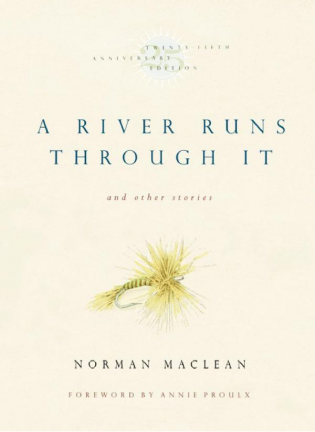 I finished reading A River Runs Through It last week. The prose — written by Norman Maclean in his ’70s — is so powerful and poetic, it halted me on several occasions. The ending made me cry.
I finished reading A River Runs Through It last week. The prose — written by Norman Maclean in his ’70s — is so powerful and poetic, it halted me on several occasions. The ending made me cry.
Among other things, Maclean dishes advice on faking it until you make it: “Many of us probably would be better fishermen if we did not spend so much time watching and waiting for the world to be perfect,” he writes. Or as his brother Paul often said, “Gentleman, you can’t catch fish with flies in the air.”
Maclean also takes aim at modernization: “What a beautiful world it was once… You could leave beer to cool in the river, and it would be so cold when you got back it wouldn’t foam much. It would be a beer made in the next town if the town were ten thousand or over. So it was either Kessler Beer made in Helena or Highlander Beer made in Missoula… What a wonderful world it was once when all the beer was not made in Milwaukee, Minneapolis or St. Louis.” (NOTE: You can replace the word “beer” with just about anything. Nostalgic.)
But my favorite passage was this: Continue reading…
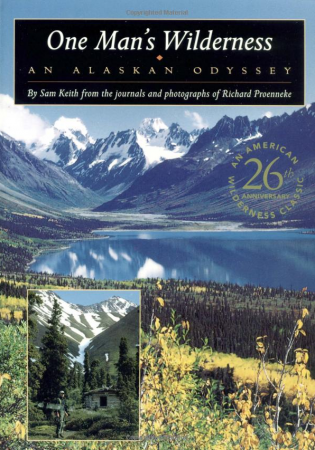 I finished One Man’s Wilderness recently and enjoyed its simple prose and short stories. It’s a 200 page book about one man building a log cabin in an isolated part of Alaska and living alone for sixteen months.
I finished One Man’s Wilderness recently and enjoyed its simple prose and short stories. It’s a 200 page book about one man building a log cabin in an isolated part of Alaska and living alone for sixteen months.
It’s similar to Walden, although more adventurous. It’ll compel you to visit Alaska and encourage a new appreciation for hard work and minimalism. Three stars out of four. Some of my favorite passages were:
- “Chores are easier if forethought is given to them and they are looked upon as little pleasures to perform instead of inconveniences that steal time and try patience.”—p. 30
- After a hard day of work chopping wood: “The grand finale! Drive the ax into the block, look around, and contemplate the measure of what you have done.”—p. 33
- “There’s no sleeping pill like a good day’s work.”—p. 39
- “Needs: I guess that is what bothers so many folks. They keep expanding their needs until they are dependent on too many things and too many other people… I wonder how many things in the average American home could be eliminated if the question were asked, ‘Must I really have this?'”—p. 209
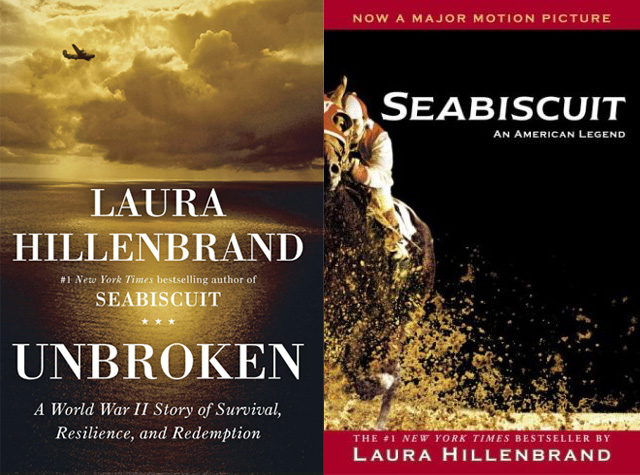
I read Unbroken last year and liked it so much I emailed the author after finishing it because it was so well researched, written, and told. Yesterday I finished Seabiscuit, Hillenbrand’s first book. Despite seeing and really liking the movie first, reading the story allowed me to cheer for the Biscuit as if I were there. A lot of fun. 4 stars out of 5. Not quite as accomplished as Unbroken, which I give 4.5 stars out of 5. But certainly more “exciting” non-fiction with more endearing characters. Either way, both are wonderful.
You’re welcome.
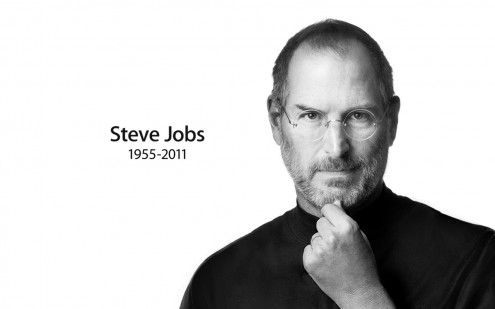
Assuming his biography well represents him, Steve Jobs was a jerk for much of his life. A work-a-holic with eating disorders, incredibly bratty, ruthless.
I’m sure a lot of devout followers will excuse his actions with “no one is perfect.” I prefer that justification, however, for people who are at least trying to improve their social skills with age, instead of sticking to their anti-social guns as Jobs did for much of his life.
Continue reading…

Almost like something Orwell would write fiction about. For example, derelict buildings devoid of capitalism. See more
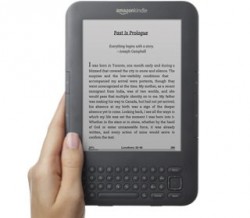 A year and a half ago, I ignorantly called e-readers The Emperor’s New Clothes.
A year and a half ago, I ignorantly called e-readers The Emperor’s New Clothes.
Today, it is I who stands naked before you.
To be fair, I still buy printed books. But only because I’m a cheap skate and I like being able to pass my favorite books on to friends and family—can’t do that with my Kindle.
That said, e-readers are a great way to own hundreds of classics for free, not to mention the occasional contemporary book bought on discount. Not only that, but Kindle is a wonderful way to read literature.
New prediction: E-readers, will in fact, replace the majority of books (but not all, they will stay niche like pencils).
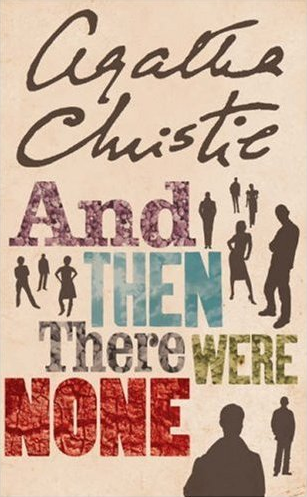 I have. On many occasions, in fact.
I have. On many occasions, in fact.
It all started in college. I’d head to class early to get a jump on my studies, get bored within 30 minutes, then open to whatever novel, biography, or paperback I had bookmarked for personal enjoyment. In the course of my four year, 63-credit undergraduate education, I’d do this several times each semester.
Once I remember ditching an entire day of classes — Neverending Story-style — just to read Dan Brown. I had only planned to skip my first lecture.
Oops.
I’ve even been know to play professional hooky from time to time. Deadline at work? Too bad, I gotta see how Tom gets out of his latest pickle.
Just today, I slotted in a few minutes of And Then There Were None underneath the backyard maple tree, after eating a delicious meatball sandwich (thanks, Lindsey). Once my mental clock chimed in telling me to get back to work, I consciously dismissed it just so I could see how soldiers five, six, and seven died.
(The book is bloody brilliant, btw. Not only that but it’s remarkably written.)
Admittedly, my boss is a softy and does a horrible job in tracking my time. But I can’t think of a better way of grabbing life by the horns than reading a book when you really should be doing something else.
That or an afternoon baseball game, whichever comes first.
See more: Books I’ve blogged about
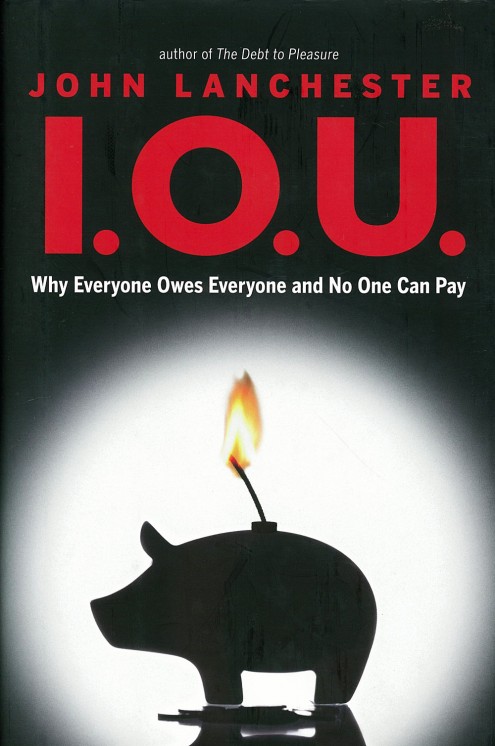
Fascinating book. To the point and practical.
For example, the best way to describe a retail bank is to call it a piggy bank. The best way to describe an investment bank is to call is a casino, which is precisely what each are.
Who knew a book about high finance, banking, and The Great Recession could be such a fun read?
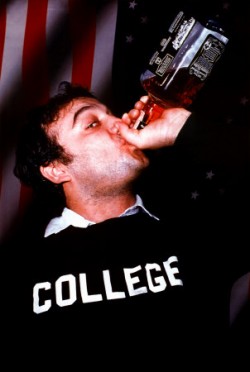 As the value of higher education continues to decline, these are some great alternatives: Start a business, travel the world, create art, make people laugh, write a book, work for a charity, master a game, master a sport. Splendid!
As the value of higher education continues to decline, these are some great alternatives: Start a business, travel the world, create art, make people laugh, write a book, work for a charity, master a game, master a sport. Splendid!
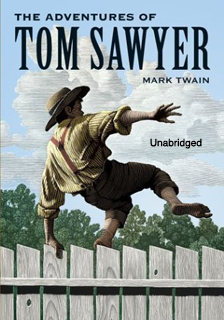 It took me a while, but I finally got around to reading Mark Twain, starting with The Adventures of Tom Sawyer, which I finished this week.
It took me a while, but I finally got around to reading Mark Twain, starting with The Adventures of Tom Sawyer, which I finished this week.
I figured the author was good, given all the praise that’s continuously heaped on him. But I didn’t know he’d be this good. I had no idea he was as laugh-out-loud funny as Jerry Seinfeld (even more so, maybe).
More than that, Twain has the uncanny ability to turn even the most mundane occurrences into entertaining literature (i.e. a poodle playing with a beetle). He is a master of the English language and a joy to read. As a bonus, he’s a modern day Confucius, sharing wisdom and life hacks throughout this 184 page book.
Here are 10 of my favorite passages: Continue reading…

As recently seen in a book read to the girls. Anyone know the book?
… than watching this. Usually (I make exceptions for high-profile sporting events and the occasional Netflix stream.)
Point is, DVR lowers your standards. You wouldn’t watch half that crap (and by “crap,” I mean poorly produced, written, and acted shows when compared to movies) if it were live. So why subject yourself to lesser entertainment? I’m sure some people use DVR as it was designed: to make it easier to watch the shows you used to watch live. But the majority of DVR users actually abuse the technology, and end up watching more television (i.e. settling) than they normally would.
In that sense, DVR is not better living through technology. It’s clouding our judgment. It’s reducing our ability to think critically.

I read Nineteen Eighty-Four this month for the first time. What struck me most about the book was not George Orwell’s impracticable vision of totalitarianism. (On the contrary, there are “less arduous and wasteful ways” of satisfying a government’s lust for power.) Rather, it’s how overwhelming the antagonist is. For example, consider this “you can’t stop us” speech given by Comrade O’brien, as he tortures our anti-hero Winston into submission: Continue reading…
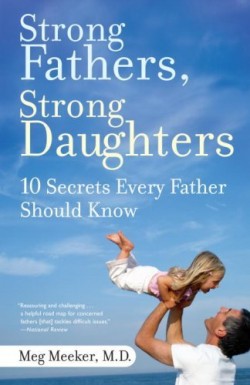
As the father of two girls, with another on the way, I’ll take all the help I can get concerning their well-being and development. And although it could have been written using fewer words, the 197-page Strong Fathers, Strong Daughters was an enlightening wake-up call to some of the challenges my daughters will likely face. After reading it, I felt empowered and reassured of the fathering techniques I already held to be true.
Written by Meg Meeker, a child psychiatrist and mother of four, the book is peppered with personal stories and alarming statistics. The stated “10 secrets” aren’t really secrets as much as their are good advice. To summarize, they are as follows: Continue reading…
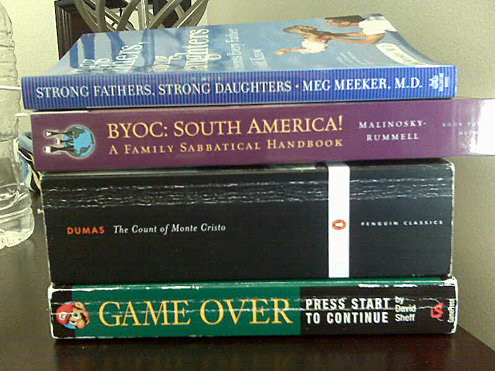
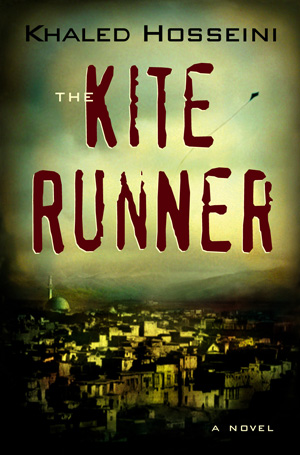 I finished reading The Kite Runner a couple of weeks ago. Here are my postmortem thoughts:
I finished reading The Kite Runner a couple of weeks ago. Here are my postmortem thoughts:
- The book starts slow, but quickly picks up once the story flashbacks to the protagonist growing up in late ’70s and early ’80s Afghanistan.
- Khaled Hosseini is a great writer. You’ll enjoy reading his style.
- The book has one of the best twists I’ve ever read. About a third of the way through, you will literally be shocked by a very grave revealing.
- Published in 2004, there is no bloated author introduction to be found. Yay!
-
Continue reading…
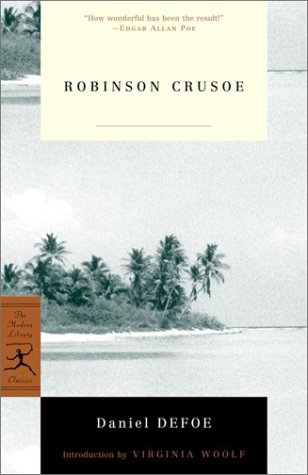 At the recommendation of a long-time Smooth Harold reader (thanks, Nic), I finished Robinson Crusoe over the weekend. Regarded as the first novel written in English and first published in 1719, it’s a story about high-sea adventure, shipwrecks, castaways, gratitude, hard work, and international intrigue.
At the recommendation of a long-time Smooth Harold reader (thanks, Nic), I finished Robinson Crusoe over the weekend. Regarded as the first novel written in English and first published in 1719, it’s a story about high-sea adventure, shipwrecks, castaways, gratitude, hard work, and international intrigue.
What I like most about the book is Defoe’s poetic commentary on human behavior. For example, after Robinson nearly drowned at sea for the first time, he quickly swore off his selfish ways and committed himself to God, before changing his mind after disaster had been averted: Continue reading…
My wife and I have been reading classic literature this year. She finished Jane Eyre last week before starting Great Expectations, and I tackled Out of Africa and Old Man and the Sea before moving to Robinson Crusoe. We both agree: it’s inspiring stuff—and much better than junk food reading.
We also agree that those wordy, overblown, or otherwise melodramatic introductions by semi-popular modern authors are lame. I understand it’s a marketing ploy to sell more re-released books, and you can always skip ’em. But they get in the way of great literature. I have yet to read an author introduction that I enjoyed. Let me get to the book already, or at least call the thing an “author retrospective” and put it in the back of the book.
Dumb.
I was 15 the first time I read Ernest Hemingway’s Old Man and the Sea. I remember thinking when discovering it: “Really? A Pulitzer Prize book that’s only 127 pages? I can do that!” And I did.
I liked it. It was an easy read. I felt for the man, and it was inspiring. Last week, I finished it for the second time, some 14 years after I first read it. My feelings haven’t changed much, but I appreciate Hemingway’s metaphors more so this time than the last. Some updated thoughts:
Continue reading…
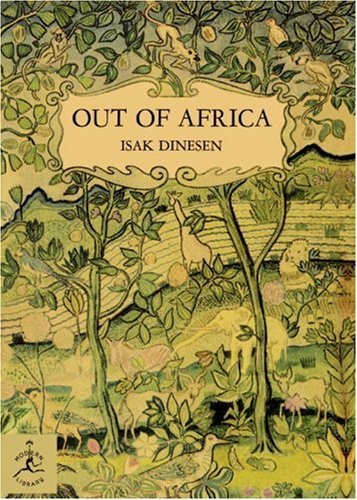 By recommendation, I finished reading Out of Africa by Isak Dinesen last month. Though hardly a page-turner, I have a stronger appreciation for Africa after reading this book than by reading or seeing any other material on the subject. It’s a true story about a Danish transplant and her experience running a farm in east Africa.
By recommendation, I finished reading Out of Africa by Isak Dinesen last month. Though hardly a page-turner, I have a stronger appreciation for Africa after reading this book than by reading or seeing any other material on the subject. It’s a true story about a Danish transplant and her experience running a farm in east Africa.
It’s not the easiest read. I lost interest from time to time for a page and a half. But a compelling short-story is always within reach, making the effort worth it. For example, consider this little gem of an observation:
“Native [Africans] dislike speed, as we dislike noise, it is to them, at the best, hard to bear. They are also on friendly terms with time, and the plan of beguiling or killing it does not come in to their heads. In fact the more time you can give them, the happier they are, and if you commission a Kikuyu [Kenya’s most populous ethnic group] to hold your horse while you make a visit, you can see by his face that he hopes you will be a long, long time about it. He does not try to pass the time, but sits down and lives it.”
Lovely reading. And a great book if you want to improve your writing.
After a seven month hiatus (having only read 4-5 books last year), I caught the reading bug again. To stay the course, here are a dozen classics I’d like to read in 2009:
Anna Karenina
1984
War and Peace
The Adventures of Huck Finn
In Search of Lost Time
The Stories of Anton Chekhov
Middlemarch
Moby Dick
The Catcher in the Rye
For Whom the Bell Tolls
I’m currently reading Out of Africa and plan to re-read the following: Hamlet, The Great Gatsby, The Old Man and the Sea, and To Kill a Mockingbird (I remember liking them in high school). Off a recommendation from a well-read friend, I’m also excited to read Water for Elephants and The Kite Runner. And for cheap thrills, I’m going to read The Firm and The Rainmaker, two Grisham novels I missed.
Anything I should add?
UPDATE: Robinson Crusoe, The Count of Monte Cristo, Of Mice and Men, Measure for Measure, the complete Jane Austen collection, Man’s Search for Meaning.
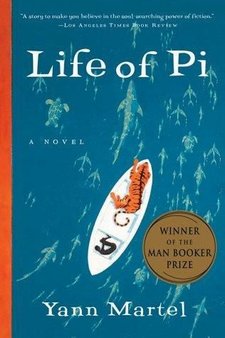 I finished reading the popular Life of Pi last night. In sum, it’s a clever endorsement for zoos, storytelling, and the existence of God, either allegorically or literally.
I finished reading the popular Life of Pi last night. In sum, it’s a clever endorsement for zoos, storytelling, and the existence of God, either allegorically or literally.
Author Yann Martel’s use of metaphors is inspired and makes me feel inadequate as a writer when it comes to creatively describing objects, emotions, and experiences. For that, I was in awe — and laughing at times. Overall, I give the book four stars out of five for dragging a little in the first and second acts. Chapter 97 is my favorite.
If I were a disoriented high school or college student, and were forced to answer the following discussion guide questions for a homework assignment, these would be my answers:
Continue reading…
Though I’m embarrassed to say it, especially given that my livelihood (read: writing) depends on it, I’ve seemingly broken up with nutritious reading this year. Without noticing, I’ve gone more than seven months without reading a single book (okay, maybe one). I’m not even sure why.
I still read junk literature on a daily basis (i.e. online articles), but those don’t count. I need more Hemmingway, Austen, and Potok in my diet. Unfortunately, I have no desire to open a book, due to a prolonged state of atrophy and laziness. I want to fall in love again and admire my wife and colleagues who remain passionate about the medium.
Have you ever broken up with books? If so, how did you rekindle the fire?
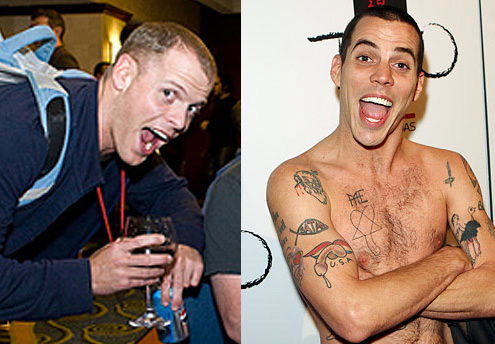
I’ve always thought these two looked eerily similar, and now I have proof. Ferriss is clearly a strawberry blonde Steve-O. And with that, I have finally become a niche celebrity blogger. It only took me three years.
See also: Book review: The 4-Hour Work Week
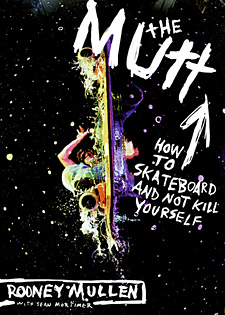 After a quick and entertaining three days, I finished reading The Mutt: How to Skateboard and Not Kill Yourself by Rodney Mullen, the most influential skater in history. No, it’s not a how-to book, as my wife first believed
After a quick and entertaining three days, I finished reading The Mutt: How to Skateboard and Not Kill Yourself by Rodney Mullen, the most influential skater in history. No, it’s not a how-to book, as my wife first believed
Written in 2004 with the help of author Sean Mortimer, The Mutt has less to do with skateboarding and more to do with lifehacks, storytelling, business, relationships, and trying to please an impossible father. Mullen is obviously neurotic, but he comes off being genuine and likable in the book. And it’s easy to see how he became the greatest in his field, arguably more so than Tony Hawk, due to his insane work ethic. Just reading about his stingy regime makes me feel lazy, but it’s also motivating.
Continue reading…
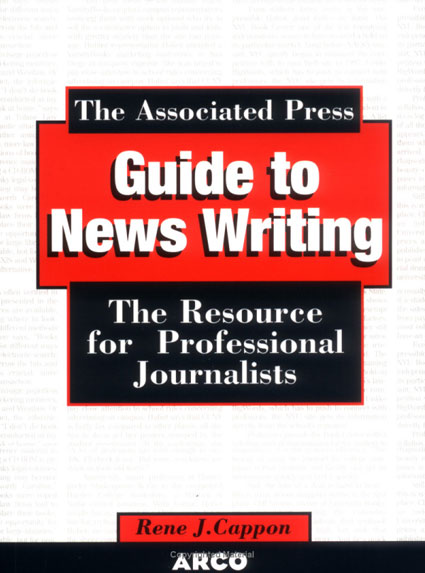 Write a lot. Then buy this book. Or vice versa.
Write a lot. Then buy this book. Or vice versa.
Don’t let the name mislead you—The AP Guide to News Writing will help you become a better writer of everything except maybe books. This quick and worthwhile read is full of helpful tips, professional counsel, and practical ways to further flex your prose.
Continue reading…
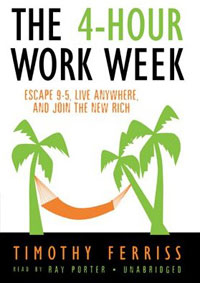 Wow. Just wow. The 4-Hour Work Week is the most influential book I’ve read in years. Author Timothy Ferris, though a self-proclaimed extremist, dishes on slowing down your life, getting out of the rat race, outsourcing menial tasks, ditching your RSS feeds, batch processing email instead of checking it every 15 minutes (if not more), reducing unnecessary information consumption in favor of productivity and real learning, how effectiveness trumps efficiency, and how the idea of “retirement” is grossly flawed. In short as the book description tells, “Escape the 9-5, Live Anywhere, and Join the New Rich.”
Wow. Just wow. The 4-Hour Work Week is the most influential book I’ve read in years. Author Timothy Ferris, though a self-proclaimed extremist, dishes on slowing down your life, getting out of the rat race, outsourcing menial tasks, ditching your RSS feeds, batch processing email instead of checking it every 15 minutes (if not more), reducing unnecessary information consumption in favor of productivity and real learning, how effectiveness trumps efficiency, and how the idea of “retirement” is grossly flawed. In short as the book description tells, “Escape the 9-5, Live Anywhere, and Join the New Rich.”
Ferriss defines the new rich as those who favor mobility, experience, and service in favor of materialism. He counsels in great detail how to setup an automated online company for newbies (easier said than done, though possible) and how to focus your daily work efforts without letting fluff work get in the way. Best of all, Ferriss delivers it all in a very grounded, balanced, and hilarious way despite what his sensational title and clever tagline suggest. Overall, the book is unthinkably smart and of value to any person over the age of 18. I resolve from here on out to work smarter while striving to do what I love further still. That and more world travel, of course. 🙂
On that note, I’m planning my attempt to ditch the Internet for an entire year. I don’t have all the kinks figured out, and twice weekly email use will have to stay, but I will triumph within the next five years. Just you watch.
From Lee Iacocca‘s book Where Have All the Leaders Gone?: “The President of the United States is given a free pass to ignore the Constitution, tap our phones, and lead us to war on a pack of lies. Congress responds to record deficits by passing a huge tax cut for the wealthy (thanks, but I don’t need it). The most famous business leaders are not the innovators but the guys in handcuffs. While we’re fiddling in Iraq, the Middle East is burning and nobody seems to know what to do. And the press is waving pom-poms instead of asking hard questions. That’s not the promise of America my parents and yours traveled across the ocean for. I’ve had enough. How about you?”
[via Kottke]
Don’t have time to read every popular business book out there? Read the book summaries at either Wikipedia or Wiki Summaries. These “Cliff Notes” of sorts work great for buzz terms, new ideas, and heavy meme books like the following:
The list could go on and on. Just Wiki a popular book and have at it. Of course, this isn’t a substitute for that excellent thing called actual reading, but it’s a great way to stay up to date, if not refresh yourself on the key ideas of emerging (or repackaged) concepts in business.
Because it’s written for already good companies. A majority of US businesses being run by entrepreneurs have yet to prove themselves. Therefore, I would like to see From Nothing to Good. Then I’ll focus on taking my company the rest of the way.
I only got through half his book, but plan on finishing it once I’m good.
 Found another one. In addition to Stardust and The Natural, The Princess Bride by William Goldman is a better film than book.
Found another one. In addition to Stardust and The Natural, The Princess Bride by William Goldman is a better film than book.



 I only read six books this year. Eight if you count the 50 page summaries I read of
I only read six books this year. Eight if you count the 50 page summaries I read of 
 Because he wrote
Because he wrote 
 I posses five and a half of the seven denominators of American millionaires, according to
I posses five and a half of the seven denominators of American millionaires, according to 




 Humans are usually influenced in one of six ways, argues Robert Cialdini in
Humans are usually influenced in one of six ways, argues Robert Cialdini in  Build character, not intelligence. That’s the gist of what parents, educators, and society should do to help children succeed, argues Paul Tough in
Build character, not intelligence. That’s the gist of what parents, educators, and society should do to help children succeed, argues Paul Tough in  I finished reading
I finished reading  I finished
I finished 


 A year and a half ago, I ignorantly called e-readers
A year and a half ago, I ignorantly called e-readers 

 As the value of higher education continues to decline,
As the value of higher education continues to decline, 




 I finished reading The Kite Runner a couple of weeks ago. Here are my postmortem thoughts:
I finished reading The Kite Runner a couple of weeks ago. Here are my postmortem thoughts: At
At  By recommendation, I finished reading
By recommendation, I finished reading 

 After a quick and entertaining three days, I finished reading
After a quick and entertaining three days, I finished reading 
